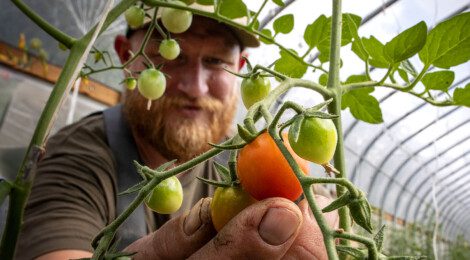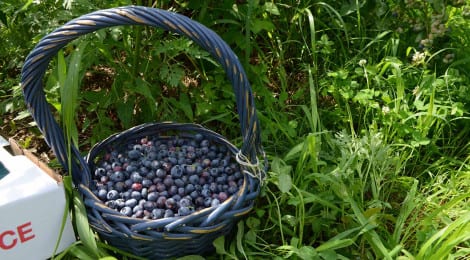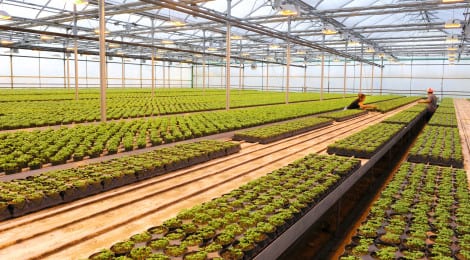
Food Vision Prize Changing Form for Function
The University of Vermont and State Agricultural College, in partnership with Norwich University, recognized that their shared desire to use more local products on their menus did not match the ability of local suppliers and processors to provide it. In partnership with other local large-scale purchasers, such as the Dartmouth Hitchcock Medical Center and the UVM Medical Center, as well as their shared food service management provider Sodexo, the Vermont Food Venture Center and the Pioneer Valley Growers Association, the team set out to identify the challenges and address them head on.
First, large-scale food purchasers like higher education and healthcare institutions do not have the labor capacity to process food once it arrives. They need cabbage to be pre-shredded, for example, or potatoes to be pre-diced. This would be a job for regional food processors, who experience their own capacity challenges due to inconsistent seasonal demand. This mismatch leads to a pricing challenge for the processed product, as well. Processors need to ramp up capacity and invest in infrastructure to meet the needs of the institutions, which means they must meet a certain price threshold to recover their costs. That threshold often comes at a price point that is too high for the institutions, who can not commit to the demand levels the processors need to drive prices down.
“Without intervention,” the team noted on their proposal, “these challenges for institutions and processors will only continue to escalate and prevent further local produce purchases by institutions.”
The project team proposes using the New England Food Vision Prize funds to invest in processing infrastructure to improve capacity and efficiency within the Vermont Food Venture Center, which already processes local vegetables for institutional use. A new Production Manager and strategic plan can help increase the Center’s capacity to meet demand, as well as coordinate with local buyers to coordinate year-round demand.
By investing in infrastructure, this project can address supply inconsistencies, thus enabling regional processors to meet price points agreeable to their institutional buyers. By coordinating higher education and healthcare institutions, the team can mitigate seasonal demand challenges that are created by campuses alone. And by addressing seasonal gaps that currently make demand unpredictable, the team can even out market demand and make it easier for processors to hire and retain qualified, year-round employees.
By leveraging year-round markets like healthcare alongside college and university campuses, this project ensures steady demand for minimally processed, local product, providing year-round positions to those in processing facilities. The upfront investment provided by the prize funds leads to a sustainable model that provides a stable and predictable demand for processed local food for institutional markets.
The University of Vermont and State Agricultural College, in partnership with Norwich University, recognized that their shared desire to use more local products on their menus did not match the ability of local suppliers and processors to provide it. In partnership with other local large-scale purchasers, such as the Dartmouth Hitchcock Medical Center and the UVM Medical Center, as well as their shared food service management provider Sodexo, the Vermont Food Venture Center and the Pioneer Valley Growers Association, the team set out to identify the challenges and address them head on.
First, large-scale food purchasers like higher education and healthcare institutions do not have the labor capacity to process food once it arrives. They need cabbage to be pre-shredded, for example, or potatoes to be pre-diced. This would be a job for regional food processors, who experience their own capacity challenges due to inconsistent seasonal demand. This mismatch leads to a pricing challenge for the processed product, as well. Processors need to ramp up capacity and invest in infrastructure to meet the needs of the institutions, which means they must meet a certain price threshold to recover their costs. That threshold often comes at a price point that is too high for the institutions, who can not commit to the demand levels the processors need to drive prices down.
“Without intervention,” the team noted on their proposal, “these challenges for institutions and processors will only continue to escalate and prevent further local produce purchases by institutions.”
The project team proposes using the New England Food Vision Prize funds to invest in processing infrastructure to improve capacity and efficiency within the Vermont Food Venture Center, which already processes local vegetables for institutional use. A new Production Manager and strategic plan can help increase the Center’s capacity to meet demand, as well as coordinate with local buyers to coordinate year-round demand.
By investing in infrastructure, this project can address supply inconsistencies, thus enabling regional processors to meet price points agreeable to their institutional buyers. By coordinating higher education and healthcare institutions, the team can mitigate seasonal demand challenges that are created by campuses alone. And by addressing seasonal gaps that currently make demand unpredictable, the team can even out market demand and make it easier for processors to hire and retain qualified, year-round employees.
By leveraging year-round markets like healthcare alongside college and university campuses, this project ensures steady demand for minimally processed, local product, providing year-round positions to those in processing facilities. The upfront investment provided by the prize funds leads to a sustainable model that provides a stable and predictable demand for processed local food for institutional markets.


